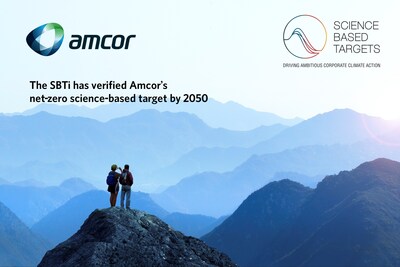Amcor's long-term SBTi targets confirmed
Rhea-AI Summary
Amcor (NYSE: AMCR, ASX: AMC), a global leader in responsible packaging solutions, has announced that its long-term carbon reduction targets have been approved by the Science Based Targets initiative (SBTi). The company aims to achieve net-zero greenhouse gas emissions across its value chain by 2050. This goal includes significant absolute reductions in scope 1, 2, and 3 emissions, using fiscal year 2022 as a base year.
The approval complements Amcor's near-term emission reduction targets, confirmed in early 2024, which align with a 1.5-degree Celsius trajectory. These near-term targets aim for a 54.6% reduction in absolute Scope 1 and 2 emissions and a 32.5% reduction in Scope 3 emissions by fiscal year 2033.
Amcor's Chief Sustainability Officer, David Clark, emphasized that these targets are integral to the company's sustainability strategy and reflect their commitment to delivering packaging that minimizes environmental impact while supporting customers' decarbonization ambitions.
Positive
- Long-term carbon reduction targets approved by Science Based Targets initiative (SBTi)
- Commitment to achieve net-zero greenhouse gas emissions across value chain by 2050
- Near-term emission reduction targets align with 1.5-degree Celsius trajectory
- 54.6% reduction target for Scope 1 and 2 emissions by fiscal year 2033
- 32.5% reduction target for Scope 3 emissions by fiscal year 2033
Negative
- None.
News Market Reaction
On the day this news was published, AMCR gained 2.44%, reflecting a moderate positive market reaction.
Data tracked by StockTitan Argus on the day of publication.
Amcor's long-term goal is to achieve net-zero greenhouse gas emissions across its value chain by 2050. This commitment includes significant absolute reductions of scope 1, 2, and 3 greenhouse gas (GHG) emissions across various areas, including purchased goods and services, energy-related activities, upstream transportation, waste management, and end-of-life treatment of sold products, by fiscal year 2050, using fiscal year 2022 as a base year.
The net-zero target approval complements the company's near-term emission reduction targets, confirmed in early 2024, which align with a 1.5-degree Celsius trajectory. The near-term targets aim for a
"We are delighted that our long-term targets have now also been validated, following the approval of our near-term targets earlier this year. These targets are an integral component of our sustainability strategy and reflect our commitment to delivering packaging that safeguards products, minimizes environmental impact and supports our customers in their decarbonization ambitions," said Amcor Chief Sustainability Officer David Clark.
For more detailed information on Amcor's near-term and long-term targets, please visit the SBTi webpage.
To learn about Amcor's decarbonization roadmap to net-zero greenhouse gas emissions, click here.
About Amcor
Amcor is a global leader in developing and producing responsible packaging solutions across a variety of materials for food, beverage, pharmaceutical, medical, home and personal-care, and other products. Amcor works with leading companies around the world to protect products, differentiate brands, and improve supply chains. The company offers a range of innovative, differentiating flexible and rigid packaging, specialty cartons, closures and services. The company is focused on making packaging that is increasingly recyclable, reusable, lighter weight and made using an increasing amount of recycled content. In fiscal year 2024, 41,000 Amcor people generated
www.amcor.com I LinkedIn I YouTube
About the Science Based Targets initiative
The Science Based Targets initiative (SBTi) is a global body enabling businesses to set ambitious emissions reductions targets in line with the latest climate science. It is focused on accelerating companies across the world to halve emissions before 2030 and achieve net-zero emissions before 2050.
The initiative is a collaboration between CDP, the United Nations Global Compact, World Resources Institute (WRI) and the World Wide Fund for Nature (WWF) and one of the WeMean Business Coalition commitments. The SBTi defines and promotes best practice in science-based target setting, offers resources and guidance to reduce barriers to adoption, and independently assesses and approves companies' targets.
![]() View original content to download multimedia:https://www.prnewswire.com/news-releases/amcors-long-term-sbti-targets-confirmed-302260059.html
View original content to download multimedia:https://www.prnewswire.com/news-releases/amcors-long-term-sbti-targets-confirmed-302260059.html
SOURCE Amcor








